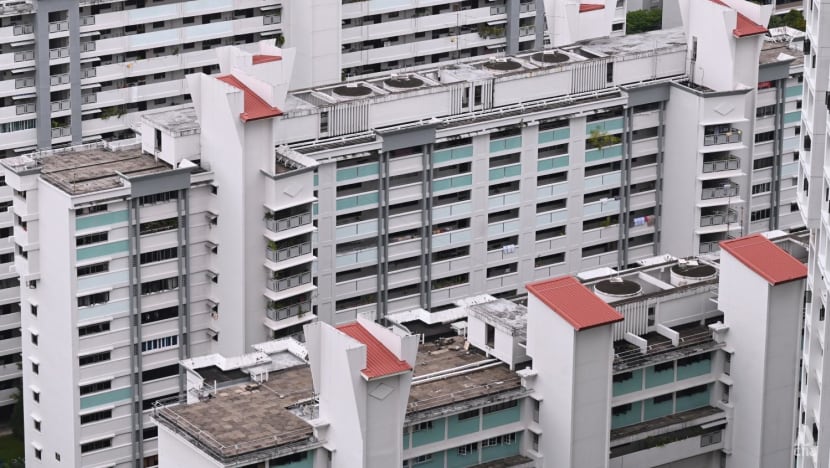CNA Explains: When can HDB compulsorily acquire flats and what does it mean for owners?
When can authorities take back a flat? Is there any compensation, and can the decision be appealed?

HDB flats in Singapore. (Photo: CNA/Gaya Chandramohan)
SINGAPORE: The Housing and Development Board (HDB) has compulsorily acquired 21 flats in about five years as a result of owners flouting minimum occupancy period (MOP) rules.
At the end of last year, the Housing Board said it was aware of property listings of “vacant” Build-to-Order (BTO) flats being sold on the open market.
During the MOP, flat owners are required to occupy their unit for five years before they are allowed to sell their flat on the open market or rent out the whole unit. They also cannot invest in private residential property during that period.
This rule applies to flats bought directly from HDB or on the resale market.
But what happens if someone flouts those rules? And when can HDB make a compulsory acquisition order?
CNA looks at what such an order means and if owners can appeal the decision.
How many flats have been taken back by HDB?
In December last year, several media outlets reported vacant BTO flats being sold on the open market. One of these was a BTO flat in Yishun that was put up for sale after being left vacant for eight years.
HDB said it is aware of such listings, and that it was investigating.
Between January 2017 and November 2022, HDB took enforcement in 53 cases where flat owners did not occupy their flats during the MOP.
Of these 53 cases, 21 flats were compulsorily acquired by HDB – 15 had bought their units on the open market while the remaining six had bought them directly from HDB.
When can HDB make a compulsory acquisition order?
According to Section 63 of the Housing and Development Act, HDB may compulsorily acquire a flat if the owner or their spouse is no longer living in the flat.
A flat may also be taken back if the unit is used for purposes other than what is allowed by the lease, without the Housing Board’s written approval.
It may also be taken back if the owner permits someone else other than the authorised occupier to say in the flat.
Owners who provide false or misleading information in their applications or related to the purchase of the flat may also have the unit compulsorily acquired by the authority.
Those who rent out their units or a part of it without obtaining prior permission from HDB may also face enforcement action, and HDB may also take back flats that are left empty by its owners.
HDB may also take back a flat if the owner ceases to be a Singapore citizen or permanent resident.
The law also states that if a flat’s rent or any payment remains unpaid for three calendar months after it is due, and a written notice was sent to the owner, HDB may compulsorily acquire the unit.
“All buyers of HDB flats are required to acknowledge HDB’s rules and regulations, including those relating to the MOP, at various points of their flat purchase process,” the Housing Board said.
Owners who face genuine circumstances and are unable to stay in their flat during the MOP – such as due to divorce or separation, medical reasons or being posted overseas for work – should write in to HDB to seek a waiver. They will be accessed on a case-by-case basis.
What happens after an order is made?
When HDB intends to compulsorily acquire a flat, a written notice must be given to the owner.
The period for the owner to move their belongings out must be at least 30 days after the notice is served. HDB may serve the notice by affixing a copy of it in a “conspicuous place” at the flat.
It may take possession of the flat on expiry of a period of 30 days.
According to the law, if the HDB officer is opposed or impeded in taking back the flat, it may take necessary measures, including calling the police, to have the occupants evicted.
If the owner fails to remove their items in the flat, HDB may dispose of the items or put them up for sale.
The acquired flat will be offered for sale under the Sale of Balance flats exercise.
In pricing these units, HDB also takes into account the prices of the comparable resale flats nearby, and the individual attributes of the flats such as their location, storey height, accessibility to amenities and facilities, remaining lease, as well as the prevailing market conditions at the time of sale.
A “significant subsidy” is then applied to keep these flats affordable, said HDB.
Is there any compensation?
When a flat is compulsorily acquired, HDB determines the compensation.
In response to CNA’s queries, HDB said its compensation policy in such cases takes into account various factors, such as the severity of the infringement and the circumstances of the cases, as well as the administrative holding costs in acquiring the flat.
“This policy ensures that flat owners who infringe the rules will not enjoy undue financial gains,” it added.
According to the Housing and Development Act, the compensation may be varied by the National Development Minister on appeal.
HDB may apply for an order to deposit the compensation in court in a few scenarios.
This can happen when a person entitled to the compensation refuses to accept it or cannot – with due diligence – be found.
If there is a dispute about the entitlement or apportionment of the compensation, such an order can also be applied for.
In the case that the person entitled to the compensation is “incapacitated by reason of mental illness” and no other person with a lasting power of attorney has been appointed, then HDB may also apply for the compensation to be deposited in court.
This may also happen if the person entitled to the compensation has died and no legal personal representative has been appointed.
What is the appeal process?
Flat owners who object to their flats being compulsorily acquired or the compensation offered may write back to HDB within 28 days after a notice is served to them.
It must cover “precisely the grounds” upon which the objection is made.
HDB must consider the objection and either disallow or allow it in part or in whole. It must also reply to the person with a written notice of this decision.
If the flat owner isn’t satisfied with HDB’s decision, they can submit an appeal to the National Development Minister within 28 days after the date of the service of the decision.
According to the Housing and Development Act, the minister’s decision is final and not open to review or challenge on any ground.
How does HDB investigate and what are the penalties?
HDB carries out about 500 inspections per month to detect violations of housing rules, such as illegal flat rentals.
Should it receive feedback on suspected cases of violations, such as flats being listed for sale without being occupied by their owners, investigations will be carried out.
Under the Housing and Development Act, the magistrate may issue a warrant to allow HDB officers to enter and search any flat sold and any other premises that the owner or occupier may be living in.
The flat owner or anyone living in the unit must allow the officers to enter the flat.
If the owners or the occupiers refuse, the officers are allowed to “break open any outer or inner door or window leading to the premises” or use other reasonable means to gain entry.
Under the Act, the officers searching the unit must prepare and sign a list of all the documents and items seized during the search. A signed copy of this list must be given to the owner, occupier or person in charge who may be present during the search.
Depending on the severity of the infringement, HDB may issue a written warning, impose a penalty of up to S$50,000, or take back the flat from the owners.
What about property agents?
Last month, National Development Minister Desmond Lee said in Parliament that disciplinary action was taken against 18 property agents who helped clients market HDB flats that may not have met the MOP between 2017 and 2022.
They were among 51 cases involving 69 property agents that the Council for Estate Agencies (CEA) investigated in those years. Investigations into 32 cases have been completed and 19 cases are still being looked into.
Of the 18 property agents who were found to have breached the code of ethics, six had their registration suspended for between seven weeks and 48 weeks, as well as received financial penalties of between S$2,000 and S$5,000.
Two property agents were issued letters of censure and one of them was also given a S$1,000 penalty. Another 10 agents were issued warning letters.


















